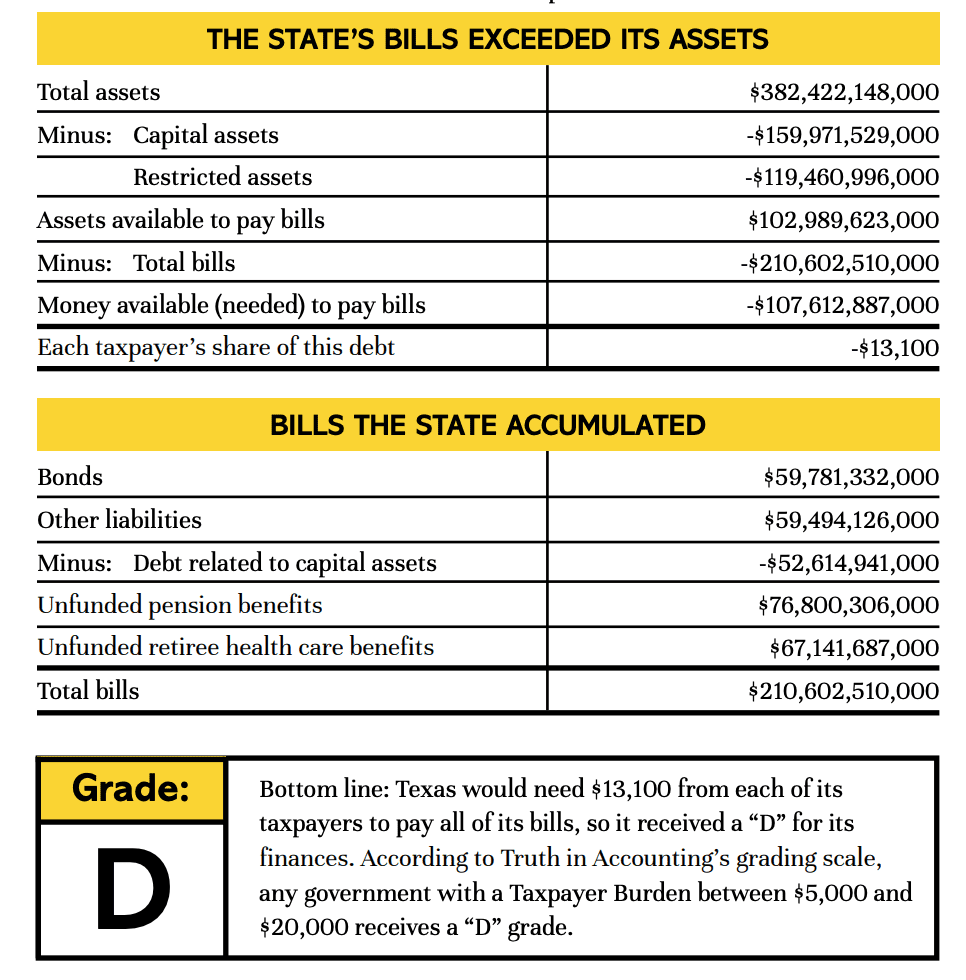Texas taxpayer debts are rising and financial health is declining due to inaccurate financial reporting, Texans not knowing their state’s true financial health, and repeated poor decisions by state officials. However, our state finances can be turned around by an accurately informed citizenry demanding balanced budgets from the Texas Legislature and Gov. Greg Abbott.
‘Sinkhole State’
“Despite receiving support from COVID relief grants and other federal programs, Texas’ overall financial condition worsened during the onset of the pandemic,” reads Truth in Accounting’s 2021 Financial State of the States report, which is “a comprehensive analysis of the fiscal health of all 50 states based on fiscal year 2020 annual comprehensive financial reports (ACFRs).”
TIA found Texas needs to take an additional $13,100 from each taxpayer to pay off its $107.6 billion of unfunded debts. Those numbers are up from last year’s report, which found $11,300 more was needed from each taxpayer to pay off the $96.7 billion of unfunded debts.
“Texas’ representative form of government is being undermined because citizens make voting decisions based upon the wrong information,” TIA CEO Sheila Weinberg told Texas Scorecard.
TIA also found the state’s elected officials left Texas unprepared for the Chinese coronavirus situation last year. “Texas did not have enough money set aside to weather the pandemic and the state has been in poor fiscal shape for years.”
Texas earned a “D” grade last year and again in this year’s report.
TIA divides states into two categories based on their analysis: “sunshine states,” which have enough money to pay all their bills, and “sinkhole states,” which don’t.
Texas is again a sinkhole state.
“This report is just another example of misconceptions by your average citizen that somehow Texas is a conservative and fiscally responsible state,” said Tim Hardin, executive director of Texans for Fiscal Responsibility.
Weinberg agreed with Hardin. “Texans have been lulled into a false sense of security while governors and legislators have accumulated debt of more than $100 billion,” she told Texas Scorecard. “These bills should have been paid in the past.”
In contrast, the No. 1 sunshine state is Alaska, with a per taxpayer surplus of $55,100. Alaska is followed by North Dakota with a per taxpayer surplus of $39,200, Wyoming with $19,500, Utah with $6,500, and South Dakota with $5,200.
What’s Driving Texas’ Financial Health Problems?
“Texas’ financial problems stem mostly from unfunded retirement obligations that accumulated over the years,” TIA found. “The state had only set aside 65 cents for every dollar of promised pension benefits and 2 cents for every dollar of promised retiree health care benefits.”
The state has not been properly funding its pension and retiree health care promises for years which has led to its financial condition continuing to deteriorate.
TIA’s report provides a breakdown of the numbers.

“It does not matter what sector you are in; private or public, this is unsustainable,” Hardin said.
How to Heal Texas
All is not lost; as Weinberg points out, citizens can stop this decline.
“The first step is to encourage lawmakers to pass truly balanced budgets that include the full costs of pension and retiree healthcare benefits,” Weinberg said. “Currently, Texas elected officials use accounting gimmicks, like shortchanging pension plans.”
Since the Texas Legislature is in its third special session, Scorecard asked Weinberg what Gov. Abbott should have legislators do. She replied that TIA doesn’t advocate for specific solutions aside from “better budgeting and accounting practices.”
“But to pay off the $107.6 billion of debt, the state needs to bring more money in or cut spending,” she said.
Why Texans Should Care
Weinberg explained why understanding Texas’ financial health is important.
“Citizens can’t effectively advocate for spending and taxing decisions because they are not given the true financial condition of the state,” she said. “Cynicism and mistrust of our governments are rampant because citizens lack the financial knowledge they need to effectively interact with elected officials.”
Elected officials bear responsibility for citizens’ lack of knowledge of their state’s true financial health.
“Since all levels of government derive their just powers from the consent of the governed, government officials are responsible for reporting their actions and the results in ways that are truthful and comprehensible to the electorate,” TIA’s report states. “Providing accurate and timely information to citizens and the media is an essential part of government responsibility and accountability.”
“Texas taxpayers need to wake up and demand more from their legislators,” Hardin said. He added TFR hopes that “2022 is the year taxpayers will send a message to Austin that they will no longer accept empty rhetoric, but will demand effective and responsible fiscal policies.”





